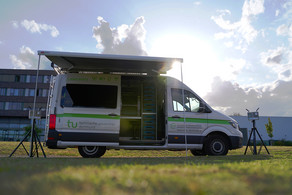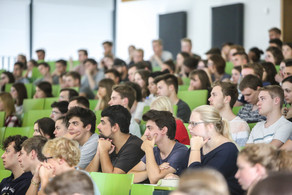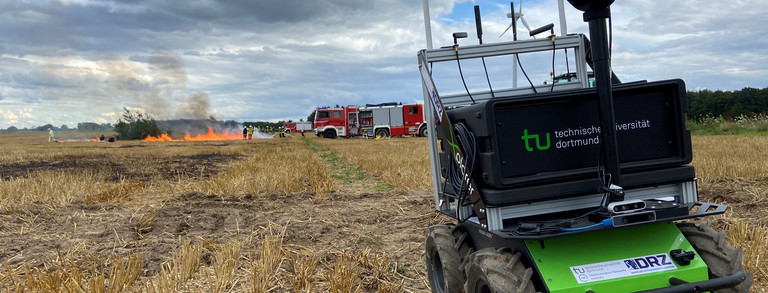6G-ANNA

6G-ANNA
The goal of the “6G-Access, Network of Networks, Automation & Simplification (6G-ANNA)” project is to develop a holistic design for the sixth generation of mobile communications that includes an end-to-end architecture. To this end, the fundamentals of radio access are first investigated, and innovative protocols and signal processing algorithms are designed and implemented. This is followed by the investigation of appropriate network management and orchestration approaches. The goal is to simplify and improve the interaction between humans, technologies, and the environment. One contribution is made by new sensors and algorithms for the recognition of human movements. For example, digital twins of complex machines in manufacturing can be precisely mapped to control them remotely. Another focus is the investigation of 6G as a “network of networks” in which - similar to the Internet - different closed networks are flexibly interconnected. Here, the focus is on security aspects and resilience. Overall, flexibility and reducing energy consumption while maintaining network performance are important goals in all research work - from individual radio access to the integration of multiple networks.
The specific objective of the TU Dortmund University is the enhancement of methods for the determination of system boundaries of novel 6G network concepts. For this purpose, TU Dortmund contributes an existing, technology-independent system for distributed load generation and extends it with regard to the requirements analysis derived in 6G-ANNA and the wireless access technologies identified/developed in 6G-ANNA. As a basis for reproducible test procedures, 6G-specific stress test methods are designed and their application to 6G network systems and services is enabled via a 6G Crossband KPI Monitoring & Control API. As a basis for a multidimensional and cross-system 6G KPI monitoring system, application-specific data traffic profiles as well as system- and environment-specific interference effects will be determined realistically and reproducibly via appropriately defined metrics.
Within the scope of a PoC with focus on "6G Access", the TU Dortmund University in close cooperation with the partners Ericsson, Fraunhofer IPT and RWTH will test the developed distributed system for the evaluation of novel 6G network components and functions in the production environment of the Fraunhofer IPT. The objective is the empirical determination and demonstration of the 6G-specific system, environment and application behavior on the basis of reproducible and demand-oriented 6G test procedures.
The project is funded by the Federal Ministry of Education and Research under the funding reference 16KISK101.
Further information:
News
Best Paper Award for AI-based design and optimization of CNI's passive reflector HELIOS
CNI presented papers at the IEEE LANMAN Symposium in Boston: both works combined AI-based algorithms with expert knowledge.
Highlight of the year: 6G conference in Berlin
CNI presented recent results of the 6G research at 6G conference in Berlin with BMBF-Minister Stark-Watzinger and over 900 participants.
Best Paper Award for 6G research with Ericsson and Fraunhofer IPT
Recent research on the IRS (Intelligent Reflecting Surfaces)-enabled mmWave systems in industrial environments presented at IEEE conference in Rome.
First face-to-face meeting of BMBF Lighthouse Project 6G-ANNA with CNI participation
The BMBF lighthouse industry project 6G-ANNA is dedicated to driving forward the 6G wireless technology with a significant budget of 38+ million Euro.
Publications
Distributed Performance Evaluation of 5G and Wi-Fi for Private Industrial Networks
C. Arendt, S. Fricke, S. Böcker, C. Wietfeld
In IEEE Int. Symposium on Personal, Indoor and Mobile Radio Communications (PIMRC), September 2024.
Custom Design and Experimental Evaluation of Passive Reflectors for mmWave Private Networks
S. Häger, M. Danger, K. Heimann, Y. Gümüs, S. Böcker, C. Wietfeld
In IEEE Symposium on Local and Metropolitan Area Networks (LANMAN), July 2024.
On Link-level Performance of Passive IRS-boosted Indoor mmWave Communications and Road Ahead
S. Häger, M. Danger, S. Böcker, C. Wietfeld
In IEEE Symposium on Local and Metropolitan Area Networks (LANMAN), July 2024.
Performance Evaluation of IRS-enhanced mmWave Connectivity for 6G Industrial Networks
M. Danger, C. Arendt, H. Schippers, S. Böcker, C. Wietfeld et. al.
In IEEE International Symposium on Measurements and Networking (M&N), July 2024.
AI-based Anomaly Detection for Industrial 5G Networks by Distributed SDR Measurements
K. Šabanović, C. Arendt, S. Fricke, M. Geis, S. Böcker, C. Wietfeld
In IEEE International Symposium on Measurements and Networking (M&N), July 2024.
Empowering 6G Industrial Indoor Networks: Hands-On Evaluation of IRS-Enabled Multi-User mmWave Connectivity
M. Danger, S. Häger, K. Heimann, S. Böcker, C. Wietfeld
In European Conference on Networks and Communications (EuCNC) & 6G Summit, June 2024.
Empowering the Convergence of Wi-Fi and 5G for Future Private 6G Networks
C. Arendt, S. Fricke, S. Böcker, C. Wietfeld
In European Wireless 2023, October 2023.
Better Safe Than Sorry: Distributed Testbed for Performance Evaluation of Private Networks
C. Arendt, S. Böcker, C. Bektas, C. Wietfeld
In 2022 IEEE Future Networks World Forum (FNWF), October 2022.





